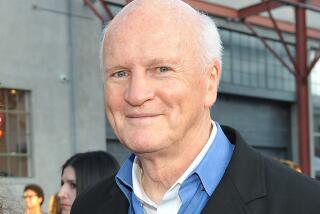Getty Trust Paid Trustee’s Legal Fees
The J. Paul Getty Trust paid $64,000 in legal fees for a wealthy board member to testify in an Italian legal proceeding despite warnings from attorneys that doing so would be inappropriate and might jeopardize the nonprofit’s tax status.
Barbara Fleischman, elected to the Getty board in 2000, incurred the fees in connection with a deposition she gave in the criminal case against former Getty antiquities curator Marion True.
Fleischman and her late husband, Lawrence, had become close friends with True while building a $60-million antiquities collection that the Getty acquired in 1996.
Fleischman joined the Getty board just as the trust learned that True was the target of an Italian investigation into trafficking in looted antiquities.
True’s defense attorney asked Fleischman to testify on the curator’s behalf. Fleischman agreed to do so and asked the Getty to pay for her legal fees, records show.
Getty general counsel Peter Erichsen told Fleischman in January 2003 that the Getty was not obligated to pay her fees because her testimony was unrelated to her service as a trustee.
He warned board members in an April 2003 memo that paying the bills “would not be appropriate.” He said payment would risk violating federal tax rules, which prohibit self-dealing, and go against Getty bylaws, which limit reimbursement of legal fees to actions taken as a trustee.
Helene Kaplan, the board’s vice chair and a New York attorney specializing in nonprofit law, agreed. “I think we would be jeopardizing our potential tax exemption by any potential plan to give her legal fees,” she said, according to a voicemail transcribed for Getty files.
But the Getty reversed its position and began paying the fees nearly two years later, records and interviews show.
Getty officials refuse to explain what led to the reversal, citing attorney-client privilege. They note that the payments were reported in the trust’s latest tax filing.
The payments raise further questions about possible misuse of tax-exempt funds by Getty board members, who are prohibited by J. Paul Getty’s will and federal tax rules from benefiting financially from their service at the institution.
Tax experts, consulted about the payments by The Times, said they agreed with Erichsen’s initial advice and expressed surprise that the Getty had gone against it.
“Unless there’s something significant that intervened, it’s astonishing,” said Harvey Dale, director of the National Center on Philanthropy and the Law at New York University.
The Getty’s payment of Fleischman’s legal fees is but the latest example of questionable spending at the Getty. Former trust chief executive Barry Munitz was forced to resign earlier this year with an internal review and an investigation by the California attorney general underway to determine whether he had used Getty resources for personal benefit.
The Times reported earlier this month that Munitz had agreed to pay retired Getty board Chairman David Gardner nearly $300,000 to write a coffee-table book after Gardner left the foundation’s board in 2004, months after he intervened on Munitz’s behalf to help the chief executive secure a five-year contract.
Both men denied any impropriety, but several experts on the laws governing nonprofits said the book deal created a potential conflict of interest.
The Getty’s payment of Fleischman’s legal fees also sheds light on an increasingly tense relationship between the Getty and Fleischman, its most generous living donor.
During her tenure on the board, Fleischman became an outspoken trustee, critical of the Getty’s administration because she thought it was not doing enough to defend True.
The tension deepened recently when an internal investigation found Fleischman had violated the trust’s conflict-of-interest rules when she and her husband gave True a $400,000 loan days before the trust acquired the Fleischman collection. As a result, Fleischman was forced to resign from the board in January.
In an interview, Fleischman said she never asked for help with her legal bills and was unaware of any of the concerns raised by Erichsen. She added that Gardner approached her with the offer to help with the fees after she had already absorbed $46,000 in legal costs.
“I exerted no pressure on anybody,” she said. “I did not raise a rumpus about this.”
John Biggs, the current Getty board chairman, said trustees agreed to pay a “narrow amount” of Fleischman’s fees because her testimony on behalf of True was “in the interest of the trust.”
Biggs indicated that Erichsen, the trust’s general counsel, had changed his mind from his earlier decision.
Erichsen “would be the first to acknowledge that the cleanest thing would have been to say ‘no,’ but frankly it was a gray issue,” Biggs said. “Peter said the argument was one that could hold water.” The Getty declined to make Erichsen available for an interview. Kaplan, the former vice chair of the board, declined repeated requests for comment.
Fleischman testified before Italian authorities in September 2004 in New York City at the request of True’s defense attorneys. They were eager to refute allegations that the curator used her relationship with the Fleischmans to “launder” looted items into the Getty by directing their purchases before the museum acquired the collection.
Fleischman testified as to how she and her husband had acquired their collection and emphatically disputed testimony from one dealer, who said the Fleischmans were purchasing at True’s behest, records show.
Records show that the Getty made two payments, in December 2004 and August 2005, totaling $64,234 to cover Fleischman’s fees from her New York law firm, Milbank, Tweed, Hadley & McCloy LLP.
Gardner, the former board chairman, said Munitz told him that Fleischman had expressed frustration over her mounting legal costs.
“Barbara was feeling under the gun and a little alone and had some strong emotional feelings about it,” he said.
Munitz declined to comment.
A former senior Getty official familiar with the payment said board members decided to rethink Erichsen’s advice and pay the fees to mollify Fleischman, who had complained at board meetings that the Getty wasn’t doing enough to protect True.
“They didn’t want her wandering around New York saying bad things about the Getty,” said the former official, who spoke on condition of anonymity. Fleischman, who is wealthy, said Gardner told her the board had “second thoughts” and offered to pay her attorneys’ bill. Fleischman said she was relieved by the offer, which also required that she recuse herself from board briefings or deliberations regarding the Italian case.
The offer, however, did not keep the peace for long. A month after the second payment, Fleischman became the subject of an internal Getty investigation of the $400,000 loan to True, which resulted in her removal. Most recently, Fleischman’s attorneys have demanded that the Getty pay additional fees Fleischman incurred during the internal probe, according to sources familiar with the request.
A bitter fight ensued, with the Getty and Fleischman’s attorney exchanging a number of strongly worded letters about the payment, the sources said.
But the Getty has refused to pay the additional fees.
More to Read
Sign up for Essential California
The most important California stories and recommendations in your inbox every morning.
You may occasionally receive promotional content from the Los Angeles Times.










